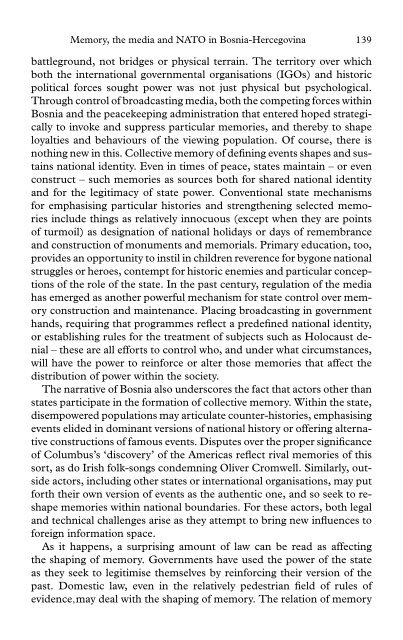Memory and Power in Post-War Europe: Studies in the Presence of ...
Memory and Power in Post-War Europe: Studies in the Presence of ...
Memory and Power in Post-War Europe: Studies in the Presence of ...
You also want an ePaper? Increase the reach of your titles
YUMPU automatically turns print PDFs into web optimized ePapers that Google loves.
<strong>Memory</strong>, <strong>the</strong> media <strong>and</strong> NATO <strong>in</strong> Bosnia-Hercegov<strong>in</strong>a 139<br />
battleground, not bridges or physical terra<strong>in</strong>. The territory over which<br />
both <strong>the</strong> <strong>in</strong>ternational governmental organisations (IGOs) <strong>and</strong> historic<br />
political forces sought power was not just physical but psychological.<br />
Through control <strong>of</strong> broadcast<strong>in</strong>g media, both <strong>the</strong> compet<strong>in</strong>g forces with<strong>in</strong><br />
Bosnia <strong>and</strong> <strong>the</strong> peacekeep<strong>in</strong>g adm<strong>in</strong>istration that entered hoped strategically<br />
to <strong>in</strong>voke <strong>and</strong> suppress particular memories, <strong>and</strong> <strong>the</strong>reby to shape<br />
loyalties <strong>and</strong> behaviours <strong>of</strong> <strong>the</strong> view<strong>in</strong>g population. Of course, <strong>the</strong>re is<br />
noth<strong>in</strong>g new <strong>in</strong> this. Collective memory <strong>of</strong> def<strong>in</strong><strong>in</strong>g events shapes <strong>and</strong> susta<strong>in</strong>s<br />
national identity. Even <strong>in</strong> times <strong>of</strong> peace, states ma<strong>in</strong>ta<strong>in</strong> – or even<br />
construct – such memories as sources both for shared national identity<br />
<strong>and</strong> for <strong>the</strong> legitimacy <strong>of</strong> state power. Conventional state mechanisms<br />
for emphasis<strong>in</strong>g particular histories <strong>and</strong> streng<strong>the</strong>n<strong>in</strong>g selected memories<br />
<strong>in</strong>clude th<strong>in</strong>gs as relatively <strong>in</strong>nocuous (except when <strong>the</strong>y are po<strong>in</strong>ts<br />
<strong>of</strong> turmoil) as designation <strong>of</strong> national holidays or days <strong>of</strong> remembrance<br />
<strong>and</strong> construction <strong>of</strong> monuments <strong>and</strong> memorials. Primary education, too,<br />
provides an opportunity to <strong>in</strong>stil <strong>in</strong> children reverence for bygone national<br />
struggles or heroes, contempt for historic enemies <strong>and</strong> particular conceptions<br />
<strong>of</strong> <strong>the</strong> role <strong>of</strong> <strong>the</strong> state. In <strong>the</strong> past century, regulation <strong>of</strong> <strong>the</strong> media<br />
has emerged as ano<strong>the</strong>r powerful mechanism for state control over memory<br />
construction <strong>and</strong> ma<strong>in</strong>tenance. Plac<strong>in</strong>g broadcast<strong>in</strong>g <strong>in</strong> government<br />
h<strong>and</strong>s, requir<strong>in</strong>g that programmes reflect a predef<strong>in</strong>ed national identity,<br />
or establish<strong>in</strong>g rules for <strong>the</strong> treatment <strong>of</strong> subjects such as Holocaust denial<br />
– <strong>the</strong>se are all efforts to control who, <strong>and</strong> under what circumstances,<br />
will have <strong>the</strong> power to re<strong>in</strong>force or alter those memories that affect <strong>the</strong><br />
distribution <strong>of</strong> power with<strong>in</strong> <strong>the</strong> society.<br />
The narrative <strong>of</strong> Bosnia also underscores <strong>the</strong> fact that actors o<strong>the</strong>r than<br />
states participate <strong>in</strong> <strong>the</strong> formation <strong>of</strong> collective memory. With<strong>in</strong> <strong>the</strong> state,<br />
disempowered populations may articulate counter-histories, emphasis<strong>in</strong>g<br />
events elided <strong>in</strong> dom<strong>in</strong>ant versions <strong>of</strong> national history or <strong>of</strong>fer<strong>in</strong>g alternative<br />
constructions <strong>of</strong> famous events. Disputes over <strong>the</strong> proper significance<br />
<strong>of</strong> Columbus’s ‘discovery’ <strong>of</strong> <strong>the</strong> Americas reflect rival memories <strong>of</strong> this<br />
sort, as do Irish folk-songs condemn<strong>in</strong>g Oliver Cromwell. Similarly, outside<br />
actors, <strong>in</strong>clud<strong>in</strong>g o<strong>the</strong>r states or <strong>in</strong>ternational organisations, may put<br />
forth <strong>the</strong>ir own version <strong>of</strong> events as <strong>the</strong> au<strong>the</strong>ntic one, <strong>and</strong> so seek to reshape<br />
memories with<strong>in</strong> national boundaries. For <strong>the</strong>se actors, both legal<br />
<strong>and</strong> technical challenges arise as <strong>the</strong>y attempt to br<strong>in</strong>g new <strong>in</strong>fluences to<br />
foreign <strong>in</strong>formation space.<br />
As it happens, a surpris<strong>in</strong>g amount <strong>of</strong> law can be read as affect<strong>in</strong>g<br />
<strong>the</strong> shap<strong>in</strong>g <strong>of</strong> memory. Governments have used <strong>the</strong> power <strong>of</strong> <strong>the</strong> state<br />
as <strong>the</strong>y seek to legitimise <strong>the</strong>mselves by re<strong>in</strong>forc<strong>in</strong>g <strong>the</strong>ir version <strong>of</strong> <strong>the</strong><br />
past. Domestic law, even <strong>in</strong> <strong>the</strong> relatively pedestrian field <strong>of</strong> rules <strong>of</strong><br />
evidence,may deal with <strong>the</strong> shap<strong>in</strong>g <strong>of</strong> memory. The relation <strong>of</strong> memory
















